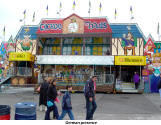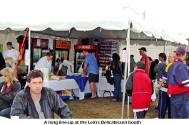
German Content
in Canadian Society
Time and again I am being asked why we do not have more German language articles in our publication, and time and again I answer: "Because I am so very proud of the many German contributions to our Canadian society that I want to share our accomplishments and our successes with other Canadians.
It is a fact that we, the German Canadians, know who we are, what we have contributed, what we have done in the past and are doing now. But it is not certain that other people out there know this. What they hear is often historical rehash designed to make bad sentiments of old linger unnecessarily.
It is human nature to listen to what others say and then to repeat it thoughtlessly without consideration to the actual facts or without personal knowledge about that subject. People listen, they do not necessarily look and then decide for themselves what is right and wrong. Thus people of German origin occasionally have to put up with public opinions on how we still have to polish our image, still so tarnished from our inglorious past.
What about our glorious past, and our glorious future, and our equally glorious present? People of German language background still make for the 3rd largest ethnic group in Canada. Judging by held down information in schools and elsewhere about German participation/contribution in the forging of this nation, or the reflections of our culture in the general cultural landscape, this figure still comes as a surprise.
In the art scene German contributions are quietly accepted, even when Wagner is being performed. It was not too long ago that we would not have been able to have the Canadian Opera Company perform a Wagner opera without major protest from certain quarters; and now we are having an entire Ring Cycle to open the newest and likely one of the best opera buildings in the world!
It also shows that Canada has grown up collectively as a nation, demonstrating more maturity and tolerance, uncommon common sense and better judgment, even though we still have a way to go towards an ideal scene. But if we look closely we have to honestly say that we are getting better in some respect. We just have to stay alert and keep insisting that our representatives take into account all of Canada’s people when distributing rights and freedoms, as our Charter of the same name suggests and guarantees. That we now have an official German Pioneers Day in Ontario is also a witness to that process. This year it will take place again one day after Thanksgiving, which is the 10th of October. It starts at 12 noon in the Rotunda of Kitchener’s City Hall with exhibits, and music by the Transylvania Hofbrau Band under Steve Schatz’ baton. At 5pm the official ceremony will start. This year the Berliner Journal, now the Record, will receive the Heritage Award. Everyone is invited to come!
Another "German" project is collaboration between the Goethe Institute and the McMaster University of Hamilton. From September 1., 2006 to August 25, 2007. The university houses one of the largest collections of German Expressionist art. The two institutions are pooling their resources to create a virtual exhibition and cultural education project with global reach, which will be available for an entire year. Other then that there will be a two part real exhibition of arts and texts by renowned German Expressionists like Ernst Barlach, Otto Dix, Kaethe Kollwitz, Ernst Ludwig Kirchner, Karl Schmidt-Rottluff and others, all names I have heard in my home and at school, some of which were forbidden artists in the 3rd Reich.
The website www.goethe-mcmaster.com will be accessible as of September 14. The launch of this project takes place in the McMaster Museum of Art.
 Echo
Germanica always looks for signs of German culture wherever we go and we do
find it nearly everywhere, even at the Canadian National Exhibition, CNE.
Echo
Germanica always looks for signs of German culture wherever we go and we do
find it nearly everywhere, even at the Canadian National Exhibition, CNE.
 First
we spotted a science project of the University of Waterloo, a car that makes
use of a hydrogen powered motor and the words on the motor where, you
guessed it - German. It did not say Hydrogen, it said Wasserstoff. We
just do not know who the generous donor was.
First
we spotted a science project of the University of Waterloo, a car that makes
use of a hydrogen powered motor and the words on the motor where, you
guessed it - German. It did not say Hydrogen, it said Wasserstoff. We
just do not know who the generous donor was.
 As
we wandered along the midway we spotted the Cuckoo Haus with words
like Danke and Willkommen prominently displayed.
As
we wandered along the midway we spotted the Cuckoo Haus with words
like Danke and Willkommen prominently displayed.
 But
best of all was the presence of Lein’s Delicatessen at the air show.
The deli favourite was serving in the public and VIP area some of their
specialties, with 3rd generation Frank Lein being in charge and
looking real good in his white chef outfit and smart hat. The line-ups at
Lein’s where long and proved to us that we are not their only fans. Needless
to say that the food was delicious. And if you want your event catered by Lein go to
www.leindeli.com.
But
best of all was the presence of Lein’s Delicatessen at the air show.
The deli favourite was serving in the public and VIP area some of their
specialties, with 3rd generation Frank Lein being in charge and
looking real good in his white chef outfit and smart hat. The line-ups at
Lein’s where long and proved to us that we are not their only fans. Needless
to say that the food was delicious. And if you want your event catered by Lein go to
www.leindeli.com.
There are other signs of German culture. On October 3rd Germany celebrates its National Holiday the Day of German Unity. This year it is celebrated again at Roy Thomson Hall, October 5th, with a reception prior to a concert, which is part of a lengthy Beethoven/Mahler Festival (September 20 to October 8). Baritone Russel Braun will lend his splendid voice to some rarely performed songs. Go to www.tso.ca to learn more about the fabulous program.
And then of course there is the Toronto Film Festival that always has quite a good selection of German/Austrian/Swiss films to showcase. This year there are again some most interesting presentations.
Just now, early into the festival time we reviewed an important film for you: " Das Leben der Anderen" OR "The Lives of Others".
The film is a story about the STASI, the East German secret police, or perhaps it is better described as a film about the search for a good person.
Glad not have to watch yet another 3rd Reich story I went to view this film that promised to give an insight into the lives of our relatives on the other side of the wall. It was a revelation in many ways and confirmed what I had already learned first hand from my own relatives and friends: living in the GDR was not much different than living in any country at any time under a regime that severely curtails the freedom of its citizens.
Interesting and authentic becomes the film because of the director Florian Henckel von Donnersmark’s choices for actual locations whenever possible, in which he filmed to make his point. But really eerie becomes the film through the performance of Ulrich Muehe, an actor who was an actual citizen of the GRD and who experienced first hand the methods of the STASI, who was spied on –or so it appears, by his then wife. His understanding of the system, his very intimate knowledge of such methods enables him to explore the character of Captain Gerd Wiesler, expert investigator of actual or potential enemies of the state. His evolution from convinced participant to a doubtful order-taker, who finally turns against the regime he sought to protect previously, is nothing short of fantastic and totally believable.
Thomas Thiele, who plays a powerful minister, also stems from East Germany, which he left in the 198ies, but after application to do so his life was hell. He too lends his considerable talent to making this film feel like a docudrama. Volker Kleinert, who plays a director who was forbidden to work in his craft, recalls being asked to "perform" for the STASI. He had the courage to refuse, but the threats made were very real, he says.
Through the performances of these actors with their first hand experience of a communist regime we become intimately engaged with an almost Brechtean plot.
When a few years ago a Kremlin archivist came to visit he told an assembly at the University of Toronto, that in any communist regime, - and let us not forget that the GRD was communism’s model state- nothing is sacred and private and everything is recorded and filed for posterity in minute detail. The huge archives of the Kremlin as well as those of the GDR confirm that. We now know that the STASI employed 91 thousand individuals, 13 thousand of whom regulated 170 thousand "unofficial" employees, in other words informants, thus keeping an entire nation and all those " lives of others" under surveillance.
Everything in this movie rings absolutely true. It will have happened or almost like it in thousands of cases again and again.
The art of this film lies in a very clear and concise painting of the lives of a writer and his circle of friends, the Minister with personal desires abusing his powers in the name of state security, and the operatives in the effort to find something to denunciate the writer.
Alongside we meet collaborators; dissidents and we search for a good and decent person who can see what is really going on. And we find him in unexpected quarters.
Every time we think the movie is over, there comes another appendix, an after story, which lightens our hearts, at least a bit. But we are also painfully aware that innocent people die unnecessarily and some people will never change for the better, no matter what form of government they live under.
Until next time
Sybille Forster-Rentmeister
Comments to: sfr@echoworld.com


